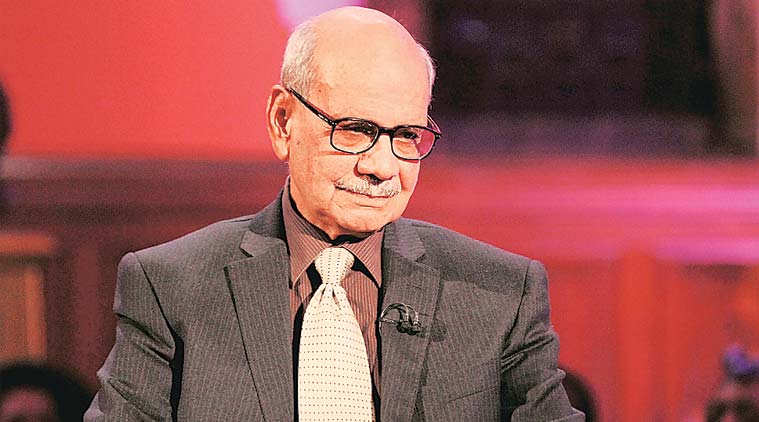General in the limelight
Asad Durrani’s memoir bares murky dealings in Pakistan’s security establishment. But that doesn’t exonerate the ex ISI chief

Lt Gen Asad Durrani was the chief of Pakistan’s ISI from 1990 to 1992.
In 1996, Pakistan’s retired Air Force chief Asghar Khan wrote a letter to the then chief justice of Pakistan alleging that the then President of Pakistan Ghulam Ishaq Khan, Army Chief General Aslam Beg, Director General Inter-Services Intelligence (ISI) Lieutenant-General Asad Durrani and ex-Habib Bank Sindh chief and Mehran Bank owner, Younis Habib, had doled out Rs 140 million among several politicians ahead of the 1990 polls to ensure Benazir Bhutto’s defeat. In 2012, the Supreme Court, in its short order, ruled that the late Ghulam Ishaq Khan, Beg and Durrani acted in violation of the Constitution by facilitating the success of a group of politicians and political parties against rival candidates in the general election of 1990, for which they secured funds from Younis Habib. The generals thereafter went in for a review.
In 2018, after 22 years, the case is — understandably — still in court. As the ISI factotum of the army chief, General Asad Durrani had distributed the bribe that rigged the polls. In his book, Pakistan adrift; navigating troubled waters (2018) he writes: “In September 1990, a few weeks after I had taken over as the DGISI, the COAS, General Aslam Beg, told me that some businessmen from Karachi who had been at the receiving end of PPP’s recently dismissed government, would like to contribute to the Opposition’s election campaign.”
He had hardly any compunction about carrying out the order: “I collected Rs 140 million from one Younas Habib, a banker by profession and presumably acting as the middleman of the donors. Nearly half the amount was distributed from accounts opened in Karachi, Quetta and Rawalpindi, to individuals or parties as indicated by the presidency, directly to me, or at times through General Beg. The rest was deposited in a special fund in the ISI, with which I was told the donors had agreed”.
He had hardly any compunction about carrying out the order: “I collected Rs 140 million from one Younas Habib, a banker by profession and presumably acting as the middleman of the donors. Nearly half the amount was distributed from accounts opened in Karachi, Quetta and Rawalpindi, to individuals or parties as indicated by the presidency, directly to me, or at times through General Beg. The rest was deposited in a special fund in the ISI, with which I was told the donors had agreed”.
Durrani here appears to be attributing the rigging to President Khan. But he was actually obeying his chief, General Beg, who had become the army chief after Zia-ul-Haq was killed in an aircrash in 1988. Durrani thought that he was a bit crazy but decided obedience was in order if his career was to move on.
It is easy to get offended with Durrani — he can be cocky, brash and insulting. Yet he writes well and is clearly a gifted man, which is rare in the army. He headed both the Military Intelligence (MI) and the ISI, was posted as ambassador to Germany and Saudi Arabia, thought poorly of politicians and took the paramountcy of the army in Pakistan as the norm. He didn’t think highly of his boss General Beg — “enigmatic” — but deferred to him as a junior officer knowing nothing will happen to him if things went wrong when he was obeying orders, which it did.
Beg thought America would be defeated when it attacked Iraq to punish Saddam Hussein’s trespass into Kuwait in 1990 and coined his doctrine of “strategic defiance” against America and set about getting rid of Benazir Bhutto’s elected government. He asked Durrani to tell Benazir she’d be better off in a national government that would include all the political parties, thus depriving her of policy-making powers and allowing the army to call the shots. Durrani obeyed. Then Beg asked him to use his spooks to get her parliamentarians to defect and thus cause her government to fall. He obeyed. His ISI spooks were caught red-handed in a sting operation while “persuading” Benazir’s MNAs to defect.
Durrani seeks limelight. He fell for BBC’s Hard Talk and opined that President Obama’s 2011 secret operation that killed Osama bin Laden in Abbottabad was known to Pakistan army: “In my assessment, Pakistan was in on the strike”. Then, talking to AS Dulat in Spy Chronicles (2017), he came out with more details about how the Americans found out that bin Laden was living in Abbottabad: “I have no doubt that a retired Pakistani officer who was in intelligence walked in and told the Americans. I won’t take his name because I can’t prove it and also I don’t want to give him any publicity. How much of the 50 million dollars he got, who knows. But he is missing from Pakistan. I should know”.
How does he figure himself out at the end of morally flawed career? He appends a mea culpa at the end of the book: “Anyone who has risen to the exalted rank of a three-star General… retired as the head of the topmost training institution of the armed forces and, after retirement, was twice made the country’s ambassador, should be expected to be reasonably sane. But when I reflect on my past, some of my actions were so outlandish that there must have been an invisible hand that kept pulling me out of all the trouble I got myself into”.
What he had, in fact, was “immunity of the pips” which haunts Pakistan. “I did not like old-fashioned constraints and suffered from the illusion that I could hold my own against the rest of the world. In fact, the others proved cleverer. They massaged my ego, prodded me to talk more, and were not taken in,” is Durrani’s exit line.
What he had, in fact, was “immunity of the pips” which haunts Pakistan. “I did not like old-fashioned constraints and suffered from the illusion that I could hold my own against the rest of the world. In fact, the others proved cleverer. They massaged my ego, prodded me to talk more, and were not taken in,” is Durrani’s exit line.
The writer is consulting editor,Newsweek Pakistan
For all the latest Opinion News, download Indian Express App
More From Khaled Ahmed
- The Blasphemy TestPakistan’s apex court has shown guts by acquitting Asia Bibi despite clerics’ anger. A governor of Punjab, Salmaan Taseer, had died at the hands of…
- Integration vs The UmmahBoth UK and Pakistan are dealing with effects of a radicalised Muslim population..
- A gulf too wideDespite cultural affinities with Iran, Pakistan remains closer to the Arab states..








































No hay comentarios:
Publicar un comentario